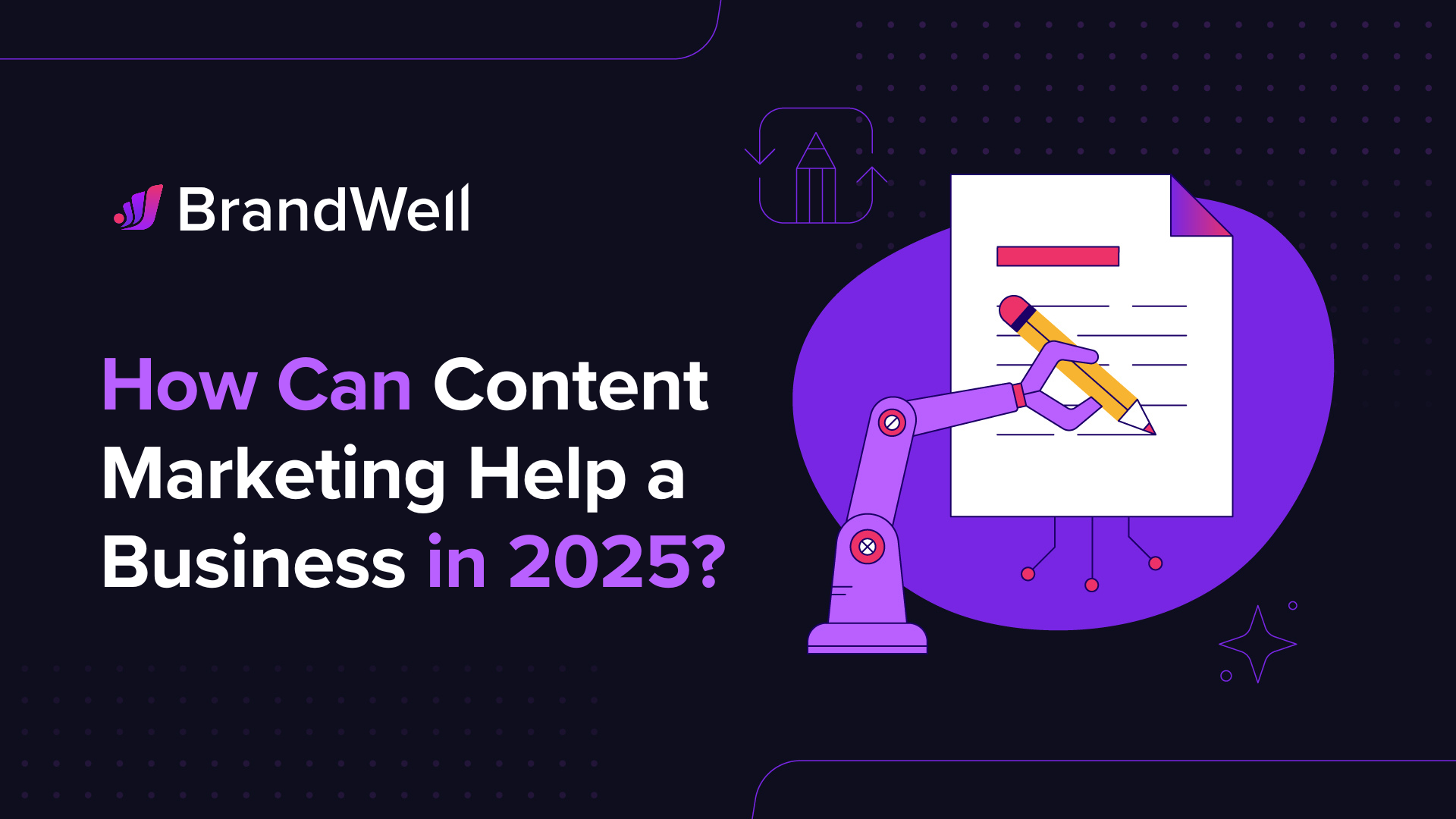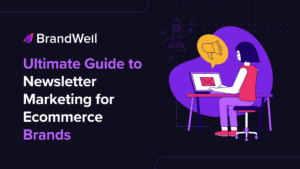In today’s fast-moving digital world, businesses struggle to cut through the noise. Traditional ads are getting ignored, and customer trust is harder to earn than ever.
The good news? Content marketing remains one of the most effective ways to engage audiences and drive business growth.
The bad news? The competition is fierce.
A whopping 90% of organizations still use content marketing in 2025, and more than half (55%) dedicate 11% to 50% of their marketing budget to it.
In the B2B world, it’s even more dominant — 97% of marketers say content is a core part of their strategy.
So, why do businesses continue to invest in content marketing?
Because it works.
87% of companies use it to build brand awareness, while 74% say it directly generates demand and leads.
But content marketing in 2025 isn’t just about writing blog posts — it’s about leveraging AI, video, personalization, and immersive experiences to stay ahead.
In this guide, we’ll break down exactly how content marketing can help your business in 2025 and beyond.
Let’s dive in!
Table of Contents:
Why Businesses Still Need Content Marketing in 2025
If you’re not investing in content marketing, you’re leaving money on the table.
Consumers today are bombarded with ads. They skip commercials, block pop-ups, and scroll past sponsored posts.
So, how do businesses reach them? Through valuable, engaging content.
1. People Trust Content More Than Ads
Think about it — when did you last click on a banner ad?
Probably never.
But when you needed help fixing that leaky faucet or deciding whether to buy an iPhone or Samsung Galaxy, you immediately went to Google, read the first blog post you saw, watched a product review video, or hit up social media for tips.
That’s the power of content marketing.
Customers trust brands that educate rather than just sell.
A well-written blog, a how-to video, or even a case study can build credibility and keep potential buyers engaged.
2. SEO and Discoverability: Get Found Online
Google loves fresh, relevant content. If you’re not publishing articles, guides, or videos, your website will get buried under competitors who are.
Let’s say you own an eco-friendly clothing brand. When someone searches for “best sustainable fashion brands,” will they find you?
If you have blog posts comparing fabrics, styling tips, and sustainability guides, you have a better chance of ranking high.
And higher rankings mean more organic traffic — without paying for ads.
3. Content Drives Leads and Sales
Content isn’t just for brand awareness — it brings in customers.
- A restaurant with a blog featuring recipes and cooking tips can attract food lovers who later visit. 🍵
- A software company that publishes detailed tutorials can convert readers into paying users. 📱
- An online store with product comparison guides can help hesitant buyers make a decision. 🏪
74% of companies say content marketing directly generates demand and leads. And since helpful content builds trust, those leads are more likely to convert into loyal customers.
4. Content is the Fuel for Other Marketing Channels
Think of content marketing as the engine that powers everything else.
- Social media? Needs engaging content.
- Email marketing? Works best when you share valuable content.
- Paid ads? Perform better when they lead to useful articles, not just sales pages.
Without strong content, other marketing efforts can fall flat.
5. It’s More Cost-Effective Than Ads
Paid ads can get expensive fast. Once you stop spending, the traffic disappears.
But content? It keeps working long after you create it.
A well-optimized blog post can bring in traffic for years.
A viral video can keep getting views without extra spending.
Compared to running constant ads, content marketing delivers better ROI over time.
Bottom line: Businesses need content marketing in 2025. It builds trust, boosts SEO, drives sales, and fuels all other marketing efforts. Whether you’re a small startup or a global brand, investing in content is a no-brainer.
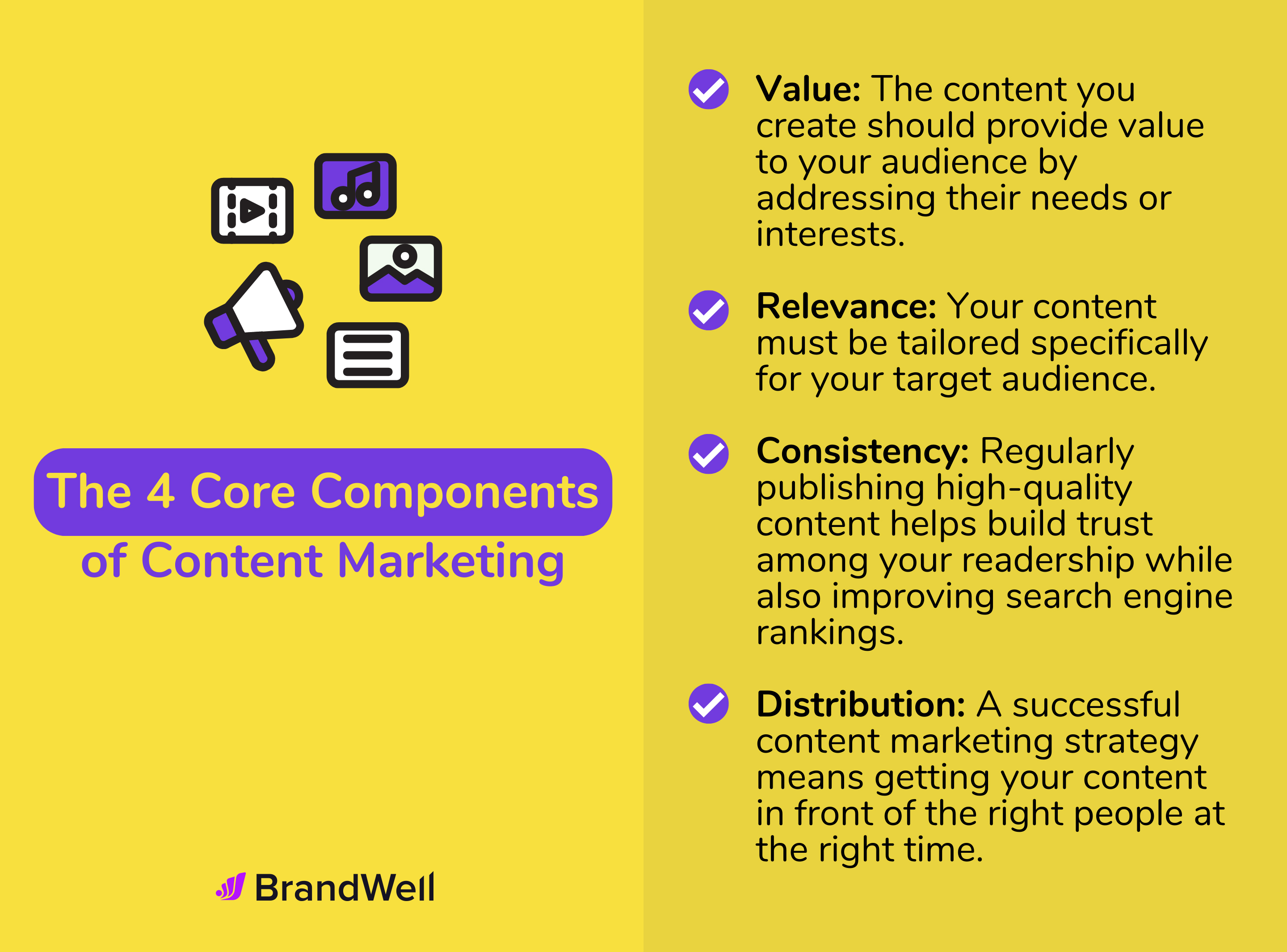
How Can Content Marketing Help a Business: 6 Key Strategies for 2025
Content marketing is evolving fast. What worked a few years ago might not cut it anymore.
In 2025, businesses need smart, strategic content marketing to stand out.
Here are the top strategies to focus on — and how to make them work for you.
1. Short-Form vs. Long-Form Content: Finding the Right Balance
In 2025, content marketing is all about balance. Some businesses swear by quick, snappy short-form content. Others go deep with long-form guides and in-depth resources.
The truth? You need both.
Each content type serves a different purpose:
Short-form content = quick engagement
✔ Best for social media, ads, and email marketing.
✔ Grabs attention fast and delivers bite-sized value.
✔ Works well for mobile audiences with short attention spans.
Long-form content = depth & authority
✔ Best for blogs, whitepapers, and in-depth guides.
✔ Establishes thought leadership and improves SEO.
✔ Builds trust and nurtures leads over time.
When to Use Short-Form Content
Short-form content is all about speed and impact. It grabs attention fast and works great for brand awareness and engagement.
- Social media posts: Instagram, Twitter, LinkedIn updates.
- Short videos: TikTok, Instagram Reels, YouTube Shorts.
- Email subject lines & newsletters: Quick, compelling copy.
- Paid ads: Catchy one-liners and attention-grabbing visuals.
For example, a SaaS company launches a new feature. Instead of writing a long blog post, they create a 15-second Instagram Reel showcasing it in action. It grabs attention, drives traffic, and sparks curiosity.
When to Use Long-Form Content
Long-form content is for depth, education, and SEO. It helps businesses rank higher on Google, build authority, and drive organic traffic.
- Blog posts & guides: Evergreen content that ranks on Google.
- Whitepapers & eBooks: In-depth resources for lead generation.
- Case studies & reports: Showcasing expertise and industry insights.
- Webinar transcripts & detailed FAQs: Providing comprehensive answers.
For example, a cybersecurity company writes a 2,500-word guide on “How Small Businesses Can Protect Their Data in 2025.” It ranks #1 on Google and brings in thousands of organic visitors every month.
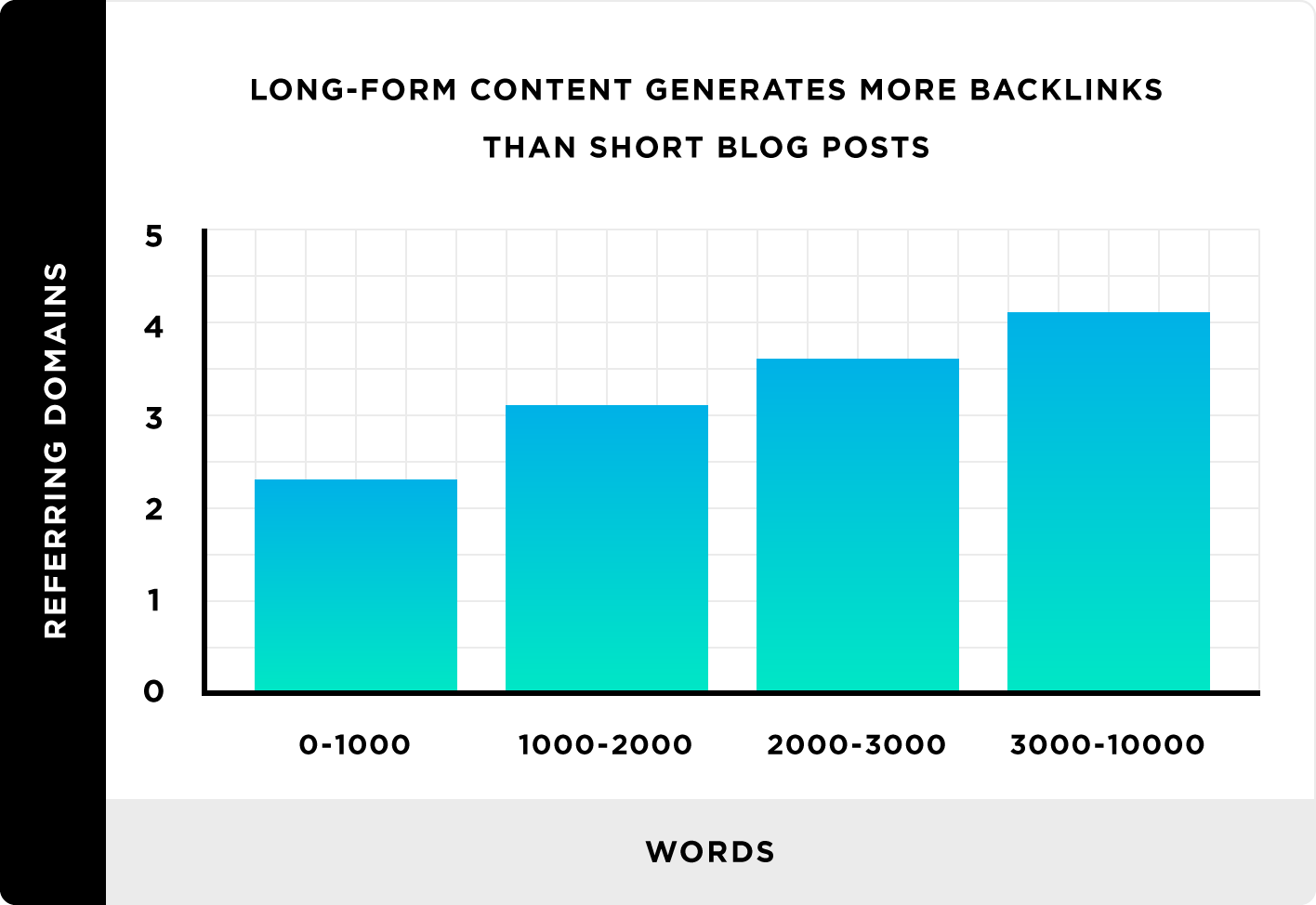
Source: Backlinko
How to Balance Short & Long-Form Content
The right mix depends on your audience and goals. Here’s a strategy I can recommend:
- Use short-form content to hook your audience (social media, ads).
- Link it to long-form content to educate & convert (blog posts, webinars).
- Retarget interested users with more short-form content to keep them engaged.
- Repurpose long-form content into short-form snippets to maximize reach and save time.
Remember: short-form content keeps your brand visible and engaging. Long-form content builds trust and authority.
2. AI-Powered Content Creation: Work Smarter, Not Harder
Creating content takes time. Researching topics, writing drafts, optimizing for SEO — it all adds up.
That’s why AI is changing the game in 2025.
Businesses need a steady flow of content, but hiring a full content team can be expensive. AI reduces the workload, so marketers can focus on strategy instead of spending hours drafting content.
AI-powered tools are not here to replace human creativity but to enhance productivity and efficiency.
Key benefits of AI-powered content creation:
✔ Saves time by generating first drafts in minutes.
✔ Helps scale content production without hiring more writers.
✔ Optimizes content for search engines automatically.
✔ Reduces writer’s block by offering topic ideas and outlines.
Now, let’s break it down by content type.
1️⃣ AI for Long-Form Content: Blogs, Guides, and Whitepapers
Long-form content is the backbone of content marketing. Blog posts, in-depth guides, and whitepapers drive organic traffic, authority, and lead generation.
But writing them takes hours — or even days!
That’s where AI tools like BrandWell come in.
BrandWell’s long-form content writer, RankWell, can help:
- Find broad and long-tail keywords relevant to your niche
- Deep-research topics, markets, and competitors
- Generate structured long-form drafts based on a keyword or topic.
- Suggest headings, subheadings, and key points for better readability.
- Ensure SEO optimization by adding relevant keywords naturally and offering real-time content optimization audits.
- Avoid fluff by keeping content clear and concise.
- Publish blog posts in WordPress and Shopify in one click.
Let’s say you need to write a 2,000-word blog post on “How to Build a Winning Content Marketing Strategy.” Instead of starting from scratch, all you have to do is enter your keyword and RankWell will generate a draft in minutes, like this:
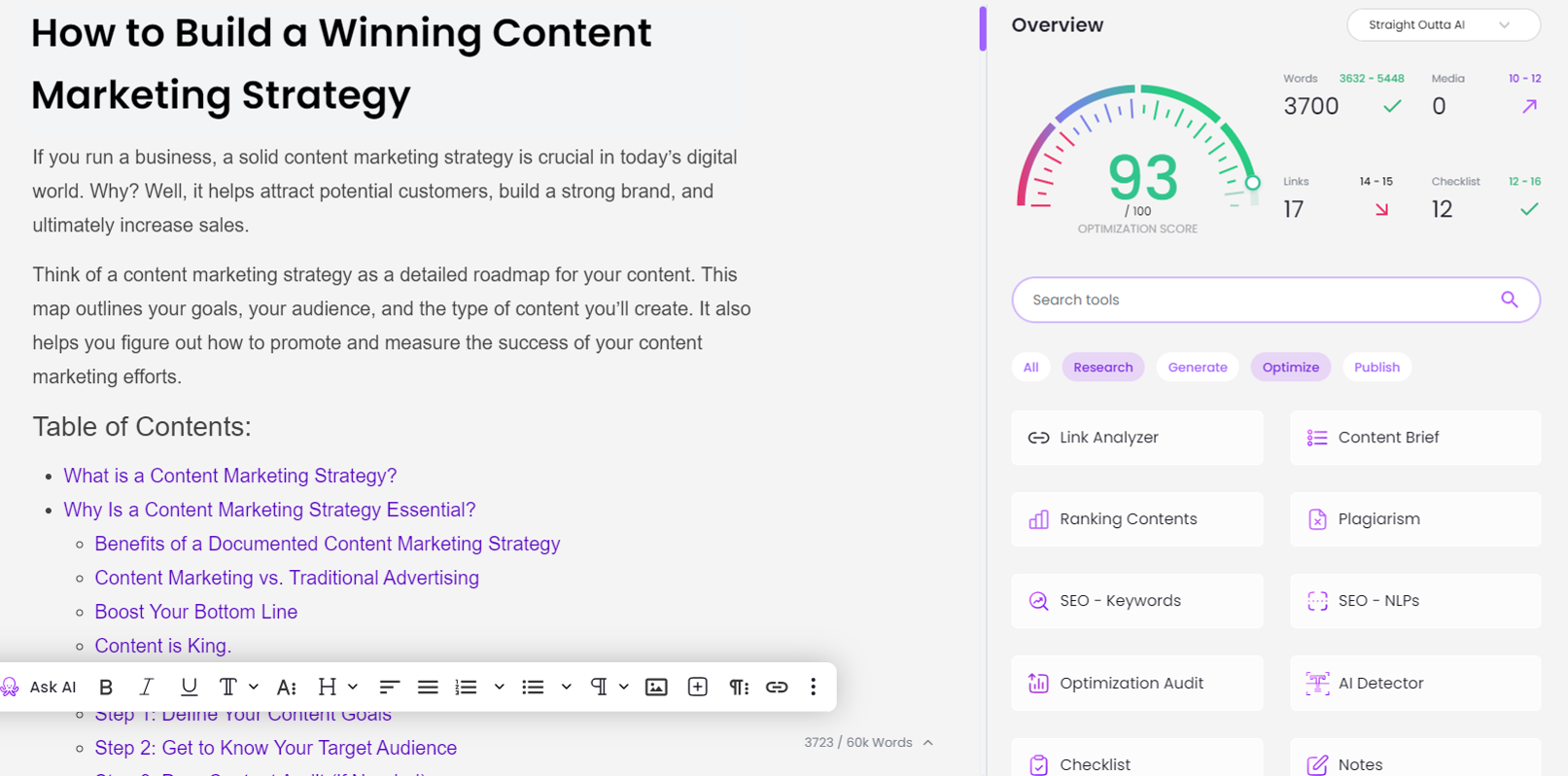
When your draft is ready, add a few images and your personal experience and insights then hit publish — saving you hours and hours of work!
💡Use AI for research and first drafts, then refine it with personal insights to keep it engaging and human.
2️⃣ AI for Short-Form Content: Social Media, Emails, and Ads
Short-form content is all about quick impact. Whether it’s a tweet, an Instagram caption, or an email subject line, every word counts.
BrandWell’s virtual writing assistant, WriteWell, can help you write:
- Social media posts for platforms like LinkedIn, Facebook, Twitter, and Pinterest.
- Video titles and descriptions for YouTube.
- Email subject lines and sequences optimized for open rates.
- Email newsletters.
- Ebooks as lead magnets.
- Scripts for webinars and podcasts.
- Sales letters.
- Product descriptions for Amazon and Shopify pages.
Here’s an example of a LinkedIn post written by WriteWell:

Ready to launch your new product? Instead of brainstorming and writing 10 unique Instagram captions, 10 tweets, and 10 Facebook posts, ask WriteWell to do it! Then tweak the best ones and schedule them in your calendar — saving you time while keeping engagement high.
💡Always test multiple variations of your content and see what resonates most with your audience.
3️⃣ AI for SEO: Ranking Higher Without Guesswork
Content is useless if no one sees it. That’s why SEO is critical.
AI helps businesses create search-optimized content without needing deep SEO expertise.
RankWell helps improve SEO content by:
✔ Suggesting high-ranking keywords based on search trends.
✔ Recommending internal linking for better site structure and external links for credibility.
✔ Analyzing competitors to find content gaps you can fill.
✔ Ensuring content meets Google’s E-E-A-T (Experience, Expertise, Authority, Trustworthiness) guidelines.
AI can help businesses scale content faster, improve SEO, and increase engagement. But it’s not about pressing a button and publishing whatever AI generates. The best results come from combining AI efficiency with human creativity.
BrandWell is one of the best tools for long-form and short-form content creation. It helps businesses create high-quality, SEO-optimized content in minutes — so you can focus on strategy, branding, and growth.
Next, let’s talk about interactive and immersive content — another must-have strategy for 2025.
3. Interactive & Immersive Content: Engage Your Audience
People don’t just want to consume content anymore — they want to interact with it.
In 2025, businesses that create engaging, two-way experiences will stand out.
Interactive and immersive content grabs attention, encourages participation, and makes content memorable.
Because it keeps audiences engaged longer, interactive content increases brand recall and even improves conversions.
Key benefits of interactive content:
✔ Increases engagement and time spent on your site.
✔ Encourages users to take action (answer a quiz, try a tool, etc.).
✔ Helps personalize the user experience.
✔ Boosts social shares and virality.
Now, let’s explore the different types of interactive content you could create in 2025.
1️⃣ Quizzes & Assessments: Make Content Fun & Shareable
People love quizzes. Whether it’s finding out their “Marketing Personality” or “Which Productivity Tool is Right for You?”, interactive assessments boost engagement and drive traffic.
Examples:
- A marketing agency creates a quiz “What’s Your Digital Marketing Weakness?” and offers personalized content recommendations.
- A fitness brand uses “Find Your Ideal Workout Plan” to segment leads and promote relevant programs.
- A SaaS company launches “Is Your Business Ready for AI Automation?” to spark interest in their product.
💡 Use tools like Typeform, Interact, or Outgrow to create quizzes. Then, capture emails by offering quiz results via email.

BuzzFeed is known for its engaging quizzes
2️⃣ Polls & Surveys: Boost Engagement & Gather Insights
People love sharing opinions. Polls and surveys make content feel more personal while giving businesses valuable customer insights.
Examples:
- LinkedIn & Instagram polls spark discussions and engagement.
- Website surveys collect feedback on user experience.
- Pre-launch surveys gauge interest before launching a new product.
A beauty brand can ask, “What’s your biggest skincare concern?” in an Instagram poll. Then, they create content addressing the top responses — instant engagement + targeted content strategy.
💡Use polls to start conversations on social media and surveys to understand your audience’s needs better.

Image source: MIQOLS
3️⃣ Interactive Infographics: Turn Data into Experiences
Static infographics are great — but interactive infographics? Even better.
They let users explore data at their own pace, keeping them engaged longer.
Examples:
- A finance blog creates an interactive chart showing “How Much You Need to Retire Based on Your Age.”
- A marketing agency visualizes “The ROI of Content Marketing” with clickable stats and case studies.
- A travel company designs a “Best Destinations for You” tool where users select their budget and interests.
💡Use tools like Infogram or Visme to create interactive visuals that keep readers engaged.
This interactive infographic from The Guardian lets readers explore the origins of common dog breeds. Hovering over each picture shows the relatedness between both breeds:
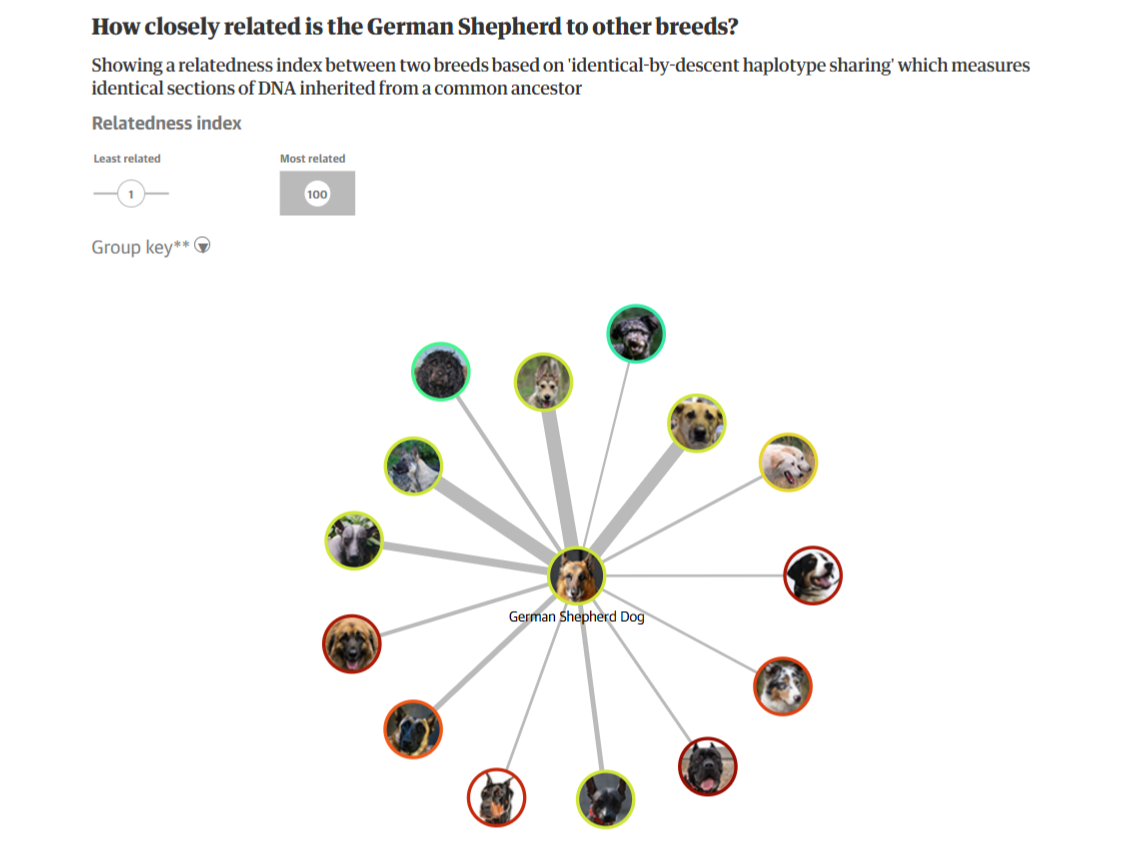
4️⃣ Augmented Reality (AR) & Virtual Try-Ons: Let Customers Test Before Buying
Augmented reality isn’t just for gaming — it’s a huge trend in e-commerce and retail.
AR allows customers to try products virtually before making a purchase.
Examples:
- IKEA lets users see how its furniture fits in their home.
- Sephora offers virtual makeup try-ons through an app.
- Warby Parker allows customers to try on glasses using their phone camera.
A fashion brand can launch a “Virtual Fitting Room” where shoppers can see how clothes fit before ordering. The result? Higher sales and fewer returns.
💡If you sell physical products, explore AR tools like Shopify’s AR features or Snap AR to enhance the shopping experience.

Shopify demonstrates AR technology in retail
5️⃣ Live & Interactive Video: Real-Time Engagement
Video content is huge — but live video takes engagement to the next level.
Live video creates real-time interaction with customers, builds trust through unscripted, authentic content, and encourages engagement through Q&A sessions, polls, and live shopping.
Examples:
- E-commerce brands host live shopping events where customers buy in real time.
- Coaches & educators do live Q&As and training sessions.
- Tech companies host live product demos and webinars.
A skincare brand can host a Live Q&A with dermatologists, answering customer questions while showcasing products. Viewers buy in real time, increasing sales instantly.
💡Use Instagram Live, YouTube Live, or LinkedIn Live to connect with your audience in real time.
Watch Cisco’s interactive video
Interactive and immersive content is more than a trend — it’s the future. Businesses that turn content into experiences will see higher engagement, better conversions, and stronger brand loyalty.
Next, let’s talk about the role of personalization in content marketing in 2025 — because generic content just won’t cut it anymore.
4. Personalized & Data-Driven Content: Speak Directly to Your Audience
In 2025, people expect brands to speak directly to them — not to a general audience. That’s why personalized and data-driven content is key.
Personalization makes content more relevant, engaging, and effective. It helps businesses convert more leads, improve customer retention, and build deeper relationships.
Just look at the numbers:
- 80% of consumers are more likely to buy from brands that offer personalized experiences.
- 91% of shoppers prefer brands that recognize their interests and provide relevant recommendations.
- Personalized email subject lines are 26% more likely to be opened.
- Personalized email campaigns can generate up to 6x higher transaction rates.
People crave tailored content. Whether it’s product recommendations, personalized emails, or dynamic website experiences, businesses that use data to customize their messaging will see better results.
Let’s break down how you can serve your audience with personalized content.
1️⃣ Segment Your Audience for Better Targeting
Not all customers are the same. Segmenting your audience allows you to create content that speaks directly to their needs, pain points, and interests.
How to segment your audience:
- By behavior: What have they clicked on, read, or purchased?
- By demographics: Age, location, job title, income.
- By interests: What topics resonate with them?
- By stage in the funnel: Are they new visitors, leads, or loyal customers?
A website visitor identification tool like TrafficID can help you dig up these details by simply installing a script on your web pages.
When you click the Leads tab on your BrandWell dashboard, you’ll see every visitor that landed on your page, in real time. You can view their full name, job role, email, phone number, LinkedIn account, and other professional insights.
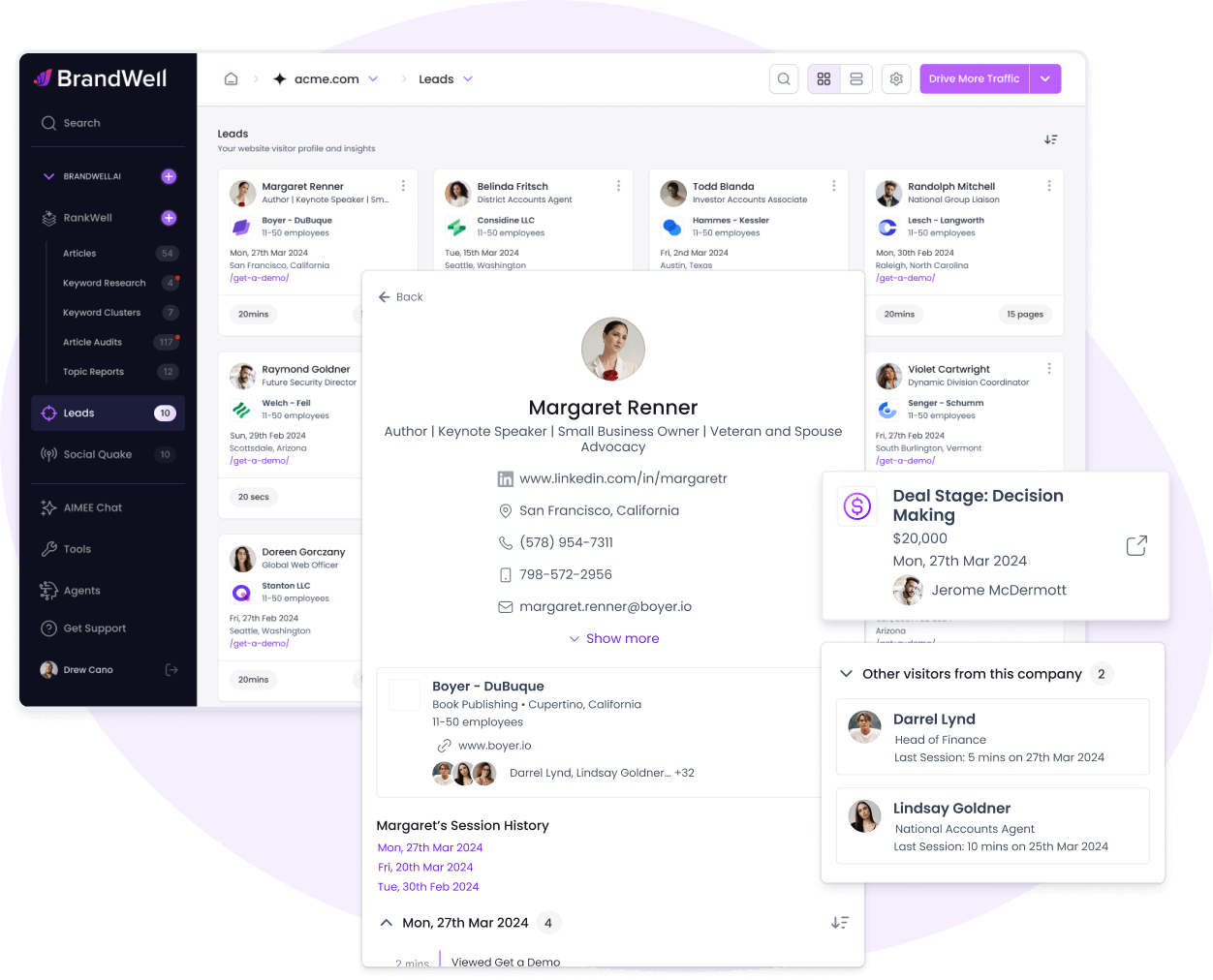
Click on a lead to view their full behavioral profile, which looks like this:
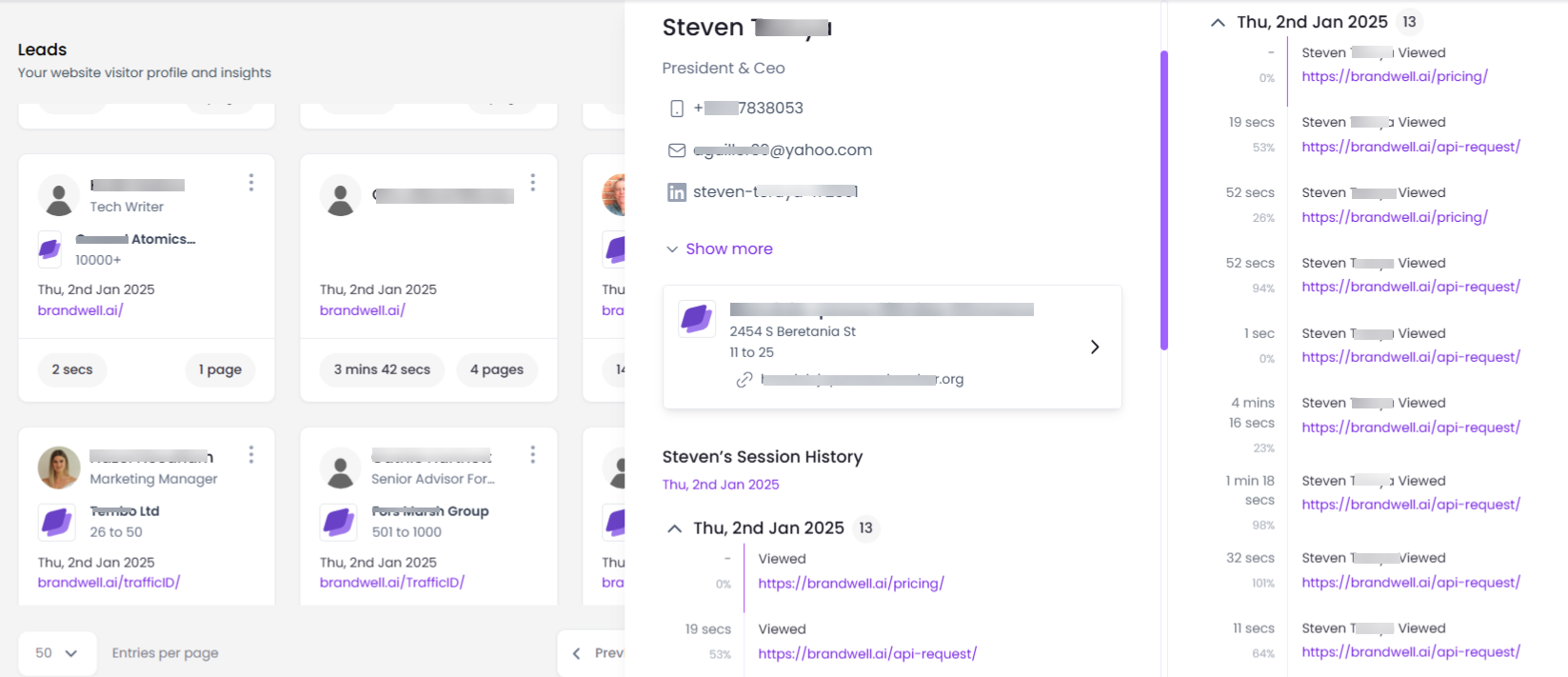
From these details, we know that visitor Steven, President & CEO of his organization, has viewed the BrandWell pricing page and made an API request. These insights make it easy to segment your audience and personalize outreach at every stage of the buyer journey.
2️⃣ AI-Powered Personalization: Deliver the Right Content at the Right Time
AI makes personalization smarter and faster. Instead of manually guessing what content your audience wants, AI can analyze data in real time and deliver hyper-personalized experiences.
- Dynamic website content – Changes based on user behavior (e.g., showing different blog recommendations based on past reading).
- AI-driven email campaigns – Sends emails at the best time for each subscriber, with personalized subject lines and content.
- Smart product recommendations – Suggest relevant products based on browsing and purchase history.
An e-commerce brand can use AI to track a visitor’s behavior. If they browse running shoes but don’t buy, the next time they visit, the homepage highlights running shoe discounts — driving conversions.
💡AI-powered platforms like BrandWell can generate personalized blog posts, product descriptions, and even tailored email sequences.
3️⃣ Leverage User Data for Hyper-Targeted Content
Businesses have access to more data than ever — but it’s how you use it that counts.
How to use data for personalized content:
- Analyze website behavior – What pages do users visit most? What do they ignore?
- Track engagement metrics – Which emails, blog posts, or videos perform best?
- Use purchase history – Recommend products based on past orders.
- Leverage social media data – Find out what topics get the most interaction.
A SaaS company could track which blog topics get the most traffic. If “Marketing Automation Tips” is the top post, they create an in-depth guide, a webinar, and a follow-up email series on the same topic—ensuring maximum engagement.
💡 Use Google Analytics, TrafficID, and Hotjar to gather insights and create content that truly resonates.
4️⃣ Personalized Email & Content Recommendations
Email marketing still delivers the highest ROI, but blasting the same email to everyone? That’s outdated.
Personalized email campaigns increase open rates, clicks, and conversions.
How to personalize email content:
- Use the recipient’s name – Simple, but effective.
- Send emails based on behavior – Abandoned cart reminders, product recommendations, follow-ups.
- Segment and tailor offers – Send different content to new leads vs. loyal customers.
If you’re selling an online course, you could send an email based on user behavior:
- If someone starts a course but doesn’t finish, they get a friendly reminder email.
- If someone completes a course, they get recommended courses based on their interests.
💡Use email marketing tools like Klaviyo, Brevo, or Kit to automate and personalize email sequences.
Remember: people don’t want generic content — they want content that feels like it was created just for them.
5. Video & Audio Content: The Rise of Multimedia Marketing
In 2025, text-only content isn’t enough.
People are consuming content differently — videos, podcasts, and interactive media are taking over.
Why? Because multimedia is engaging, easy to consume, and perfect for short attention spans.
- Video will account for 82.5% of all online content in 2025.
- Podcast listeners are expected to reach 619 million by 2026.
- Short-form videos get 2.5x more engagement than static posts.
If your business isn’t using video and audio content, you’re missing out.
Here’s how to do it right.
1️⃣ Short-Form Video: Quick, Engaging, and High-Converting
Short-form videos (under 60 seconds) dominate platforms like TikTok, Instagram Reels, YouTube Shorts, and LinkedIn Video.
Why short-form video works:
- Grabs attention fast (especially on social media).
- Boosts engagement and shareability.
- Works well for brand awareness and lead generation.
How to use short-form video in marketing:
- Showcase products/services (quick demos, unboxings).
- Answer common questions (30-second Q&A videos).
- Behind-the-scenes clips (company culture, day-in-the-life).
- Customer testimonials (authentic, bite-sized reviews).
A skincare brand can create 15-second tutorials on using their products. The result? Higher engagement and more conversions compared to static posts.
💡Use BrandWell to write your scripts and then bring them to life with AI-powered video tools like InVideo or Synthesia.

Source: Statista
2️⃣ Long-Form Video: Build Authority & Boost SEO
While short-form video is great for engagement, long-form video builds trust and authority.
Best types of long-form videos:
- YouTube tutorials & how-to videos – Helps with SEO and brand credibility.
- Webinars & live Q&As – Drives real-time engagement.
- Product deep dives & case studies – Perfect for B2B and SaaS companies.
- Vlogs & brand storytelling – Connects emotionally with your audience.
A real estate company can create a 10-minute YouTube guide on “How to Buy a Home in 2025.” The video ranks on Google and brings in thousands of leads every month.
💡Optimize long-form videos with SEO-friendly titles, descriptions, and timestamps to increase visibility.
3️⃣ Podcasts & Audio Content: Build Trust & Brand Loyalty
Podcasts are booming. More people listen to podcasts than ever before, and businesses are using them to educate, entertain, and build deeper connections with their audience.
Why podcasts work:
- People listen on the go (commutes, workouts, chores).
- Longer attention spans than social media posts.
- Great for in-depth discussions and storytelling.
How to use podcasts for marketing:
- Industry insights & expert interviews (position yourself as a thought leader).
- Customer success stories (real-world testimonials in audio form).
- Behind-the-scenes content (company updates, team discussions).
A fitness brand can launch a weekly podcast featuring top trainers and nutritionists. It grows its brand authority and brings in sponsorship deals.
💡Again, you can prompt BrandWell to write your podcast script and then record and edit with Anchor or Descript.
Check out our full guide on podcast marketing.

Source: Statista
4️⃣ Repurposing Content: Maximize Reach with Multimedia
You don’t have to create content from scratch every time — repurpose what you already have.
Ways to repurpose content into video & audio:
- Turn blog posts into YouTube videos.
- Extract short clips from long-form videos for TikTok/Reels.
- Convert webinar recordings into podcast episodes.
- Use AI voiceovers to create audio versions of blog posts.
If you have a high-performing blog post, you can turn it into:
- A YouTube tutorial (breaking down key points).
- A LinkedIn short video (highlighting main takeaways).
- A podcast discussion (expanding on the topic).
💡You can also do the reverse: turn your videos, podcasts, or digital files into a fresh, long-form, SEO-optimized blog post using BrandWell.
Discover 9 Ways to Repurpose Your Blog Content.
If you want to stay ahead in 2025, multimedia content needs to be part of your strategy.
Next, let’s dive into how businesses can use omnichannel content distribution in 2025 to maximize reach and engagement.
6. Content Distribution & Omnichannel Strategy: Maximize Reach
So you’ve got great content. Are people seeing it?
More importantly, are the right people seeing it?
If no one sees your content it won’t drive traffic, leads, or sales.
That’s why businesses in 2025 need a strong content distribution strategy that puts content in front of the right audience — at the right time, on the right platform.
With so many channels available, the key is omnichannel marketing — ensuring your content reaches people where they already spend time, whether that’s Google, social media, email, or even podcasts.
Let’s dive into how to distribute content effectively.
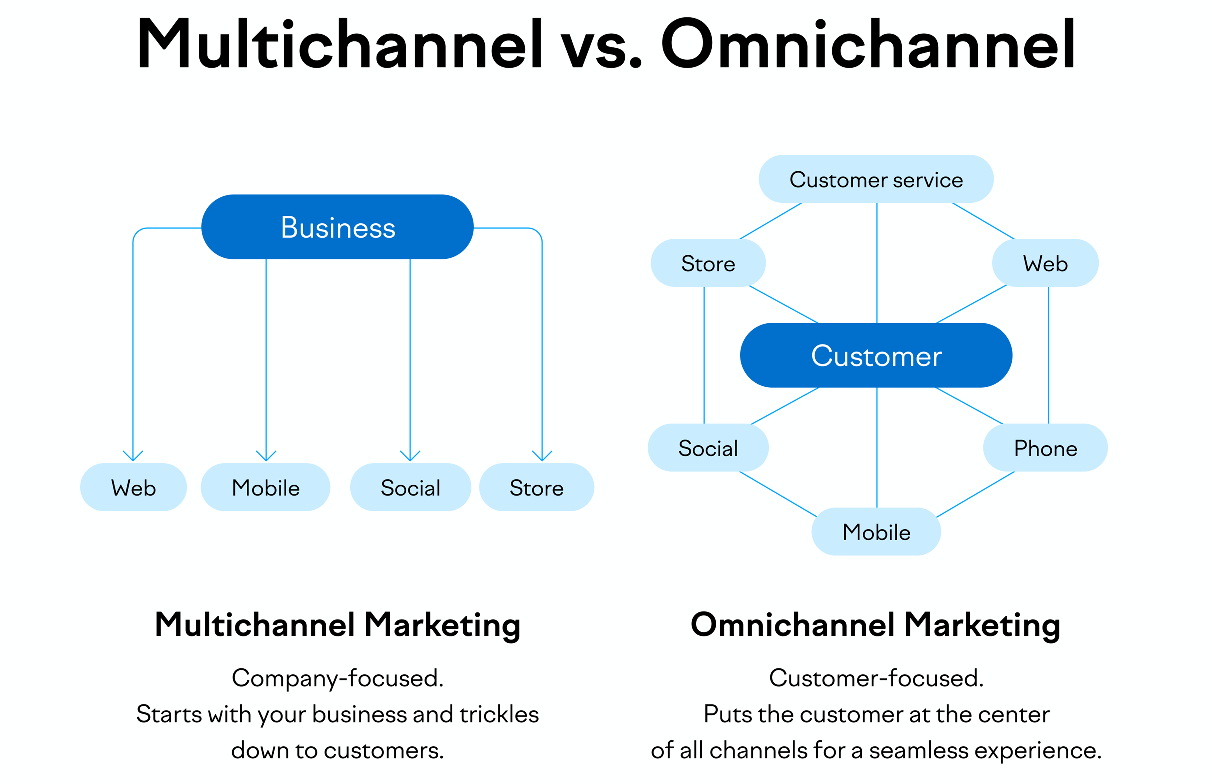
Source: Semrush
1️⃣ Optimize for Search: Get Found on Google & Beyond
SEO is still a top distribution channel in 2025. People turn to Google, YouTube, and even AI-powered search engines like Perplexity AI and ChatGPT for answers.
How to optimize content for search:
- Target long-tail keywords – Focus on search intent.
- Use AI-powered SEO tools – Automate research and content structuring.
- Repurpose content for different search engines – Optimize videos for YouTube SEO and blog posts for Google rankings.
If you have a detailed guide about a particular topic, say email marketing, you can maximize visibility by:
- Using SEO-friendly formatting (H2s, bullet points, internal links).
- Turning the blog into a YouTube tutorial (with SEO-rich video descriptions).
2️⃣ Social Media: Share Content Where Your Audience Hangs Out
Social media isn’t just for brand awareness — it’s a distribution powerhouse. Different platforms serve different audiences, so businesses need to tailor their content accordingly.
Best ways to distribute content on social media:
- Twitter (X) – Short insights, trending discussions.
- LinkedIn – B2B content, industry trends, case studies.
- Instagram & TikTok – Short-form videos, behind-the-scenes content.
- Facebook & Threads – Community engagement, discussions, storytelling.
- YouTube – Long-form video, tutorials, interviews.
Let’s use another example. If you have a blog post on “Best PPC Strategies,” instead of just sharing the link, you can:
- Turn key takeaways into a LinkedIn carousel post.
- Create a 30-second TikTok video summarizing the post.
- Host a live Q&A on Twitter Spaces.
- Share infographics on Instagram.
💡Use BrandWell to create social media content and then schedule your posts with tools like Buffer or Sprout Social to distribute content consistently across platforms.
3️⃣ Email Marketing: The Best Owned Channel for Content Distribution
Email is one of the most profitable marketing channels, yielding a return of $36 for every $1 you spend.
Unlike social media, you own your email list, meaning no algorithm changes can limit your reach.
How to use email for content distribution:
- Weekly or monthly newsletters – Summarize new blog posts, updates, and promotions.
- Exclusive content for subscribers – Guides, templates, or industry insights.
- Automated email sequences – Drip campaigns that nurture leads with relevant content.
For a SaaS company, you can send:
- A newsletter featuring your latest blog post and case study.
- An automated follow-up email recommending a relevant webinar.
- A special email for leads offering an ebook based on their interests.
💡Use BrandWell to create your newsletters and then automate and personalize email campaigns with Klaviyo, Kit, or Mailchimp.
4️⃣ Paid Distribution: Boost Visibility with Ads
Organic reach is valuable, but sometimes you need a paid push to expand your reach.
Best paid content distribution channels:
- Google Ads & PPC – Promote high-converting blog posts or landing pages.
- Social media ads – Run LinkedIn, Facebook, and TikTok ads to push valuable content.
- Native advertising – Platforms like Outbrain and Taboola distribute articles on high-traffic sites.
A B2B software company could run a LinkedIn ad campaign promoting an in-depth report. The ad targets CMOs and marketing directors, leading to higher-quality leads.
Learn more about paid advertising options in this comprehensive guide.
5️⃣ Content Syndication & Guest Posting: Expand Your Audience
Why limit content to your own site? Content syndication and guest posting let you tap into other platforms’ audiences and drive traffic back to your site.
Best ways to syndicate content:
- Publish guest posts on high-authority sites – Increases exposure, backlinks, and credibility.
- Republish content on Medium & LinkedIn Articles – Expands reach without duplicate content issues.
- Submit expert insights to industry blogs – Positions you as a thought leader.
A finance blog can repurpose its articles by:
- Publishing a guest post on Forbes (with a link back to their original guide).
- Syndicating the article on Medium or LinkedIn.
- Sharing key insights on Reddit & Quora to generate discussion.
Get more tips on how to write guest posts and republish content.
6️⃣ Community Engagement & Forums: Build a Loyal Audience
Communities and forums are great for long-term engagement. Instead of just posting content, businesses should actively participate in discussions to establish authority.
Best places to distribute content through community engagement:
- Reddit & Quora – Answer industry-specific questions with links to in-depth content.
- Facebook & LinkedIn groups – Share insights and engage in discussions.
- Discord & Slack communities – Nurture leads and provide value in niche groups.
A tech startup can share a detailed answer on Quora about cybersecurity trends, linking to their blog post on cybersecurity best practices — driving thousands of views and referral traffic.
💡Use tools like SparkToro to find where your audience hangs out online.
By combining interactive content, video, personalization, and smart distribution, businesses can keep their content fresh, engaging, and driving real results in 2025.
Don’t have a strategy yet? Here’s a complete guide on how to create a content marketing strategy.
Measuring Content Marketing Success in 2025
Creating great content is one thing — knowing if it’s actually working is another.
In 2025, businesses need to track the right metrics to understand what’s driving traffic, engagement, and conversions.
Forget vanity metrics like page views and social media likes — they don’t always translate to real business growth. Instead, let’s focus on actionable, ROI-driven data that helps fine-tune your strategy.
1. Track Engagement Metrics: Are People Actually Interested?
Just because people see your content doesn’t mean they care about it. That’s why engagement metrics matter.
Key engagement metrics to track:
- Time on page – How long are people staying on your content?
- Bounce rate – Are they leaving immediately or exploring more?
- Social shares & comments – Is your content sparking conversations?
- Watch time (for videos) – Are people watching the whole thing or dropping off early?
Let’s say a B2B blog post gets 10,000 visits, but 70% of readers bounce in under 10 seconds. This signals that the content isn’t relevant or engaging enough — time to tweak the format, add visuals, or improve storytelling.
💡Use tools like Google Analytics 4, Hotjar, or Crazy Egg to analyze user behavior and see what’s working.
2. Measure Lead Generation: Is Your Content Driving Action?
Your content should do more than attract visitors — it should convert them into leads.
Best lead generation metrics:
- Conversion rate – % of visitors who sign up, download, or take action.
- Email opt-ins – How many people join your subscriber list?
- CTA (Call-to-Action) clicks – Are people engaging with your offers?
- Lead quality – Are the leads you’re getting actually valuable?
For example, a software company publishes an in-depth ebook on automation. 1000 people download it, but only 5% book a demo. That means the lead quality needs improvement — maybe the content attracts too broad an audience.
💡 Use HubSpot, Kit, or OptinMonster to track and improve lead generation performance.

Source: Content Marketing Institute
3. Analyze SEO Performance: Is Your Content Ranking?
SEO is still a huge driver of organic traffic in 2025, but rankings don’t happen overnight.
Some SEO metrics to monitor:
- Organic traffic – How many visitors come from search engines?
- Keyword rankings – Are you ranking for high-intent search terms?
- Backlinks earned – Are other sites linking to your content?
- Click-through rate (CTR) – Are people actually clicking on your search result?
A real estate article on “Best Cities to Buy a Home in 2025” ranking in the top 3 on Google could drive thousands of organic visits every month.
💡Use Ahrefs, Semrush, or Google Search Console to track keyword rankings and improve your SEO.
4. Monitor Revenue Impact: Is Content Driving Sales?
At the end of the day, content marketing should bring in revenue. If it’s not, you might need to rethink your strategy.
Look at these revenue-focused content metrics:
- Customer acquisition cost (CAC) – How much are you spending to get a new customer?
- Customer lifetime value (CLV) – How much revenue does a customer generate over time?
- Sales conversions from content – Are blog readers becoming paying customers?
- Attribution modeling – What role does content play in the buyer’s journey?
Customers who read a blog before purchasing could have a 40% higher average order value than those who don’t — proving content plays a key role in driving sales.
💡Use Google Analytics 4, HubSpot, or Salesforce to track content’s impact on revenue.
If you’re not measuring content performance, you’re flying blind. By tracking engagement, leads, SEO, and revenue, you can fine-tune your strategy and create content that actually drives business growth.
Future-Proofing Content Marketing for Long-Term Growth
Content marketing is always evolving, and what works today might not work tomorrow. To stay ahead, businesses need to adapt, experiment, and focus on sustainable strategies that will continue delivering results in the years to come.
Here’s how to future-proof your content marketing and keep winning long-term.
1. Build an Owned Audience: Don’t Rely Solely on Social Media
Social media platforms change overnight. Algorithms shift, organic reach drops, and businesses lose direct access to their audience. That’s why owning your audience is more important than ever.
How to build an owned audience:
- Grow your email list – Email marketing is still one of the best channels when it comes to return on investment.
- Create a community – Forums, Discord servers, or private groups keep your audience engaged.
- Invest in your website – Your blog and content hub should be a go-to resource.
A fitness influencer with 500K TikTok followers who sees their engagement drop by 60% after an algorithm change can still drive traffic and sell products through their email list of 50K subscribers.
Read our Ultimate Guide to Newsletter Marketing for E-commerce.
2. Focus on Evergreen Content: Content That Stays Relevant
Trendy content gets short-term traffic, but evergreen content keeps bringing in visitors for years.
Future-proof your strategy by creating timeless, valuable resources that remain useful.
Some evergreen content ideas:
- How-to guides – Step-by-step tutorials that stay relevant over time.
- Ultimate resource lists – Collections of tools, tips, or references.
- Industry fundamentals – Content that explains core concepts.
An ultimate guide on SEO basics for beginners could still rank on Google three years later and drive thousands of organic visitors every month with minor updates.
💡Use BrandWell to refresh and optimize old content for long-term SEO performance. BrandWell automatically performs a content audit on your website when you enter its URL so you can see on your dashboard which pieces need a rewrite or refresh.
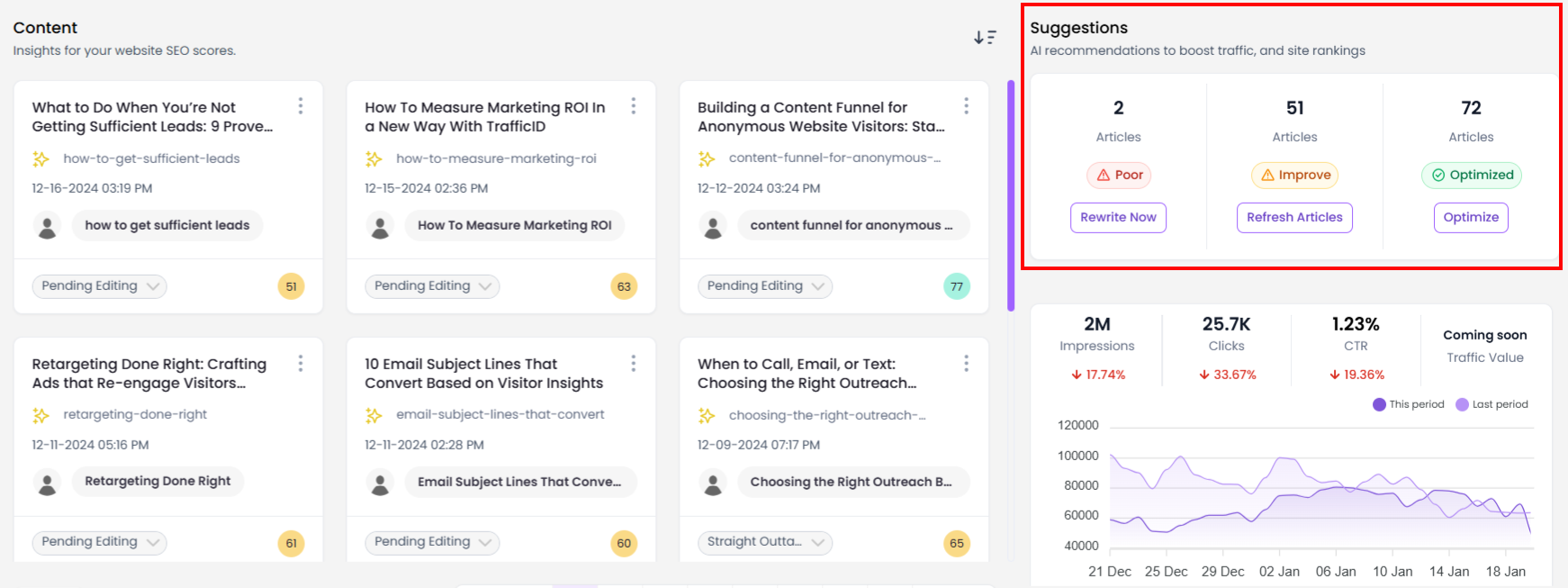
3. Stay Ahead of Emerging Trends & Platforms
The digital landscape never stays the same. Brands that test new trends early gain an edge over competitors.
What to watch in 2025 & beyond:
- AI-generated interactive experiences – Chatbots, quizzes, and personalized content.
- Voice & smart speaker content – Optimize for voice search & podcasts.
- Decentralized & blockchain-based content – Web3, NFTs, and new monetization models.
A finance blog could start producing short-form voice content optimized for Alexa and Google Assistant. This way their content becomes a top-ranking answer for voice searches, driving organic traffic from smart devices.
💡Follow industry leaders and test new platforms like Web3 social media or AI-powered search engines early.
Future-proofing content marketing isn’t about chasing every new trend — it’s about building a strong foundation, adapting to changes, and using the right tools to scale efficiently.
FAQs – How Can Content Marketing Help a Business?
What does content marketing do for a business?
Content marketing attracts, engages, and retains customers by providing valuable and relevant content. It helps businesses build trust, improve brand awareness, and drive organic traffic. By consistently publishing high-quality content, businesses can position themselves as industry leaders and generate leads that convert into sales.
What are the benefits of using a content marketing strategy?
A well-planned content marketing strategy offers several benefits, including:
- Increased brand awareness – Helps businesses reach a wider audience.
- Higher organic traffic – Improves SEO rankings and drives free website visitors.
- Better customer engagement – Builds trust and relationships with potential buyers.
- Lead generation and sales – Guides prospects through the buying journey.
- Cost-effective marketing – Delivers long-term results at a lower cost than paid ads.
How can marketing content help you sell a product?
Marketing content educates, informs, and persuades potential customers by showcasing a product’s value. Blog posts, videos, case studies, and product descriptions address pain points, highlight features, and demonstrate how the product solves problems. Well-crafted content builds trust, which increases conversions and sales.
How does marketing help in business?
Marketing drives business growth by attracting, retaining, and converting customers. It increases brand visibility, establishes credibility, and differentiates businesses from competitors. Effective marketing strategies, including content marketing, social media, and email campaigns, create awareness, generate leads, and boost revenue over time.
Why Content Marketing is a Must-Have in 2025
Content marketing isn’t just another marketing tactic — it’s the backbone of modern business growth.
In 2025, brands that create valuable, engaging, and strategic content will continue to build trust, attract leads, and drive revenue.
With AI-powered tools, immersive content, and data-driven personalization, businesses have more opportunities than ever to reach their ideal audience.
But success doesn’t come from just creating content — it comes from adapting, optimizing, and staying ahead of trends.
Whether you’re a startup, a growing business, or an established brand, one thing is clear: content marketing isn’t going anywhere — it’s evolving, and those who embrace it will thrive.
🚀 Want to scale your content creation without sacrificing quality? Try BrandWell, the all-in-one content marketing platform that helps businesses create high-quality long-form and short-form content effortlessly.

